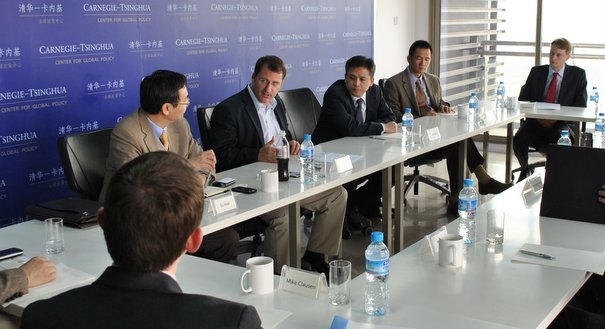Registration
You will receive an email confirming your registration.
IMGXYZ3638IMGZYXThe Strategic and Economic Dialogue (S&ED), scheduled to be held in May 2012, will mark the first formal U.S.-China bilateral dialogue since the United States announced its strategic pivot to the Asia-Pacific region last year. With March marking the fortieth anniversary of Richard Nixon’s historic visit to China and the upcoming presidential elections and leadership changes in both countries, the 2012 S&ED is a critical platform for the United States and China to make progress on issues of mutual concern. Carnegie’s Paul Haenle and Chen Qi hosted a roundtable discussion with U.S. policy-makers and Chinese scholars on the future of U.S.-China relations and the impact of this upcoming S&ED.
Fallout of the U.S. Pivot to Asia
- Is China Too Aggressive? One U.S. participant speculated that China’s increased aggression, particularly in the South China Seas, might have catalyzed the U.S. pivot to Asia. A Chinese scholar asserted that U.S. rhetoric certainly implies that China’s aggressive behavior towards its Asian neighbors was a major influence for the new policy. However, another U.S. discussant suggested that from the U.S. perspective, the fact that other Southeast Asian nations simply perceive China as potentially threatening has influenced the United States refocus on the Asia Pacific. He also noted that China had welcomed the United States to play a positive role in the Asia-Pacific and the United States is merely accepting this offer.
- U.S. Emphasis on Competition over Cooperation: Chinese scholars pointed out that the U.S. pivot to Asia policy has generated pessimism in China. As a result, the United States now appears to be emphasizing competition over cooperation in bilateral relations. While top Chinese officials have concerns over the new U.S. policy, President Hu Jintao and Barack Obama have attempted to ease the tensions through dialogue and reassurances, participants added.
- Fear of U.S. Containment: A recurring view among Chinese observers is that the United States is seeking to contain China’s growing power. Several of the U.S. discussants insisted that the U.S. pivot towards Asia was not intended to isolate China, but rather to enhance economic and diplomatic cooperation in the region. The new Trans-Pacific Partnership is aimed at strengthening and integrating regional economic relations, though the Chinese scholars expressed concerns over whether China will be excluded from membership.
Mutual Reassurance To No Avail
- China’s Reassurances Lacking Substance: While both China and the United States have taken measures to reassure each other of their good intentions, suspicion continues to persist within the bilateral relationship. One Chinese discussant assured the American participants that Chinese foreign policy will remain consistent, and its white papers should help to assure the United States that China has no intentions to act aggressively.
- U.S. Reassurances Equally Unsatisfactory: The Chinese discussant further pointed out that while the United States wants reassurance, it has done nothing on its part to reassure China of its goodwill. The announced pivot towards Asia only fosters more suspicion and mistrust. A U.S. participant claimed, however, that public statements help offer reassurance, and that these have not been asymmetrical with China’s emphasis on its white papers.
- China Wants More than Just Words: Chinese scholars insisted that the reassurance that China is looking for is not more rhetoric, but for actual distancing by the United States distance from China’s regional and international issues. This means that the United States should remain silent on issues regarding China’s bilateral relations with its neighbors and other international partners, especially regarding issues of territorial dispute.
Both Chinese and U.S. participants agreed on the need to improve the current state of relations between the two nations. Formal and informal dialogues such as the S&ED provide the best avenue for creating mutual trust and understanding. One participant pointed out that this is not a zero-sum game, and the notions of hegemonic competition must be abandoned if future progress is to be made.
